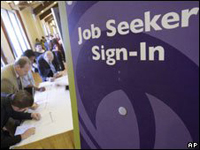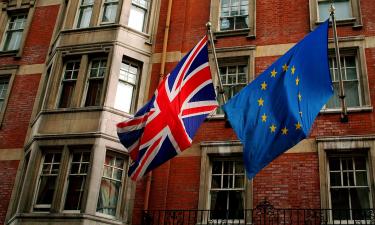Unemployment in USA jumps sharply striking fears of inflation
The unemployment rate surged to 5.5 percent in May from 5 percent — the sharpest monthly spike in 22 years — as the economy lost 49,000 jobs, registering a fifth consecutive month of decline, the Labor Department reported Friday.

The weak jobs report, coupled with a staggering rise in the price of oil — up a record $10.75 a barrel to more than $138 — unleashed a feverish sell-off on Wall Street, sending the Dow Jones industrial average down nearly 400 points. The dollar plunged against several major currencies.
Investors’ recent hopes that the United States might yet skirt a recession sank swiftly in the face of gloomy indications that the economy is gripped by a slowdown and pressured by record fuel prices.
For tens of millions of Americans struggling to pay bills, the jobs report added an official stamp of authority to a dispiriting reality they already know: A deteriorating labor market is eliminating paychecks just as they are needed to compensate for the soaring cost of food and fuel, and as the fall in house prices hacks away at household wealth and access to credit.
“It’s unambiguously ugly,” said Robert Barbera, chief economist at the research and trading firm ITG. “The average American already knows that gas prices are up a ton and it’s really hard to find a job. Sally and Sam on Main Street are already well aware of this, and that’s why sentiment surveys are lower than they were in each of the last two recessions.”
President Bush acknowledged the jump in unemployment as an indication of “slow economic growth,” but he held out hope that $100 billion in tax rebates now being distributed to American households would spur spending and generate jobs, the New York Times reports.
The net job loss across the country was 49,000 in May, bringing the total so far this year to 324,000.
Some economists said the surge in the unemployment rate probably overstated how much the job market weakened in May because it could reflect a large number of college students looking for work.
A dearth of jobs for college students has a ripple effect on teenagers, who find it that much harder to find summer work. The teenage jobless rate soared to 18.7 percent in May from 15.4 percent the month before, the biggest increase since the Labor Department began keeping the statistic in 1948.
The Federal Reserve is sure to find the job report troubling. The central bankers usually want to cut interest rates to spark the economy, as they did seven times between September and April. But the tone of recent speeches by Fed Chairman Ben Bernanke and other Fed leaders is increasingly hawkish about growing inflation threats, which argue against additional rate cuts.
The economy appears to be worsening just as the presidential general election campaign kicks off. Presumptive Democratic nominee Sen. Barack Obama of Illinois issued a statement lamenting the new job numbers, democratandchronicle.com reports.
Source: agencies
Subscribe to Pravda.Ru Telegram channel, Facebook, RSS!





